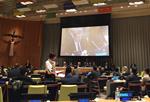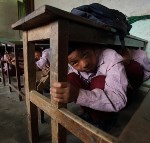Published on Thu, 2015-05-07 08:46
On October 15, 2014, the Member States of the Committee on World Food Security (CFS), hosted at the United Nations Food and Agriculture Organization, approved the “Principles on Responsible Investment in Agriculture and Food Systems.” (“RAI” or “RAI Principles”) In a recent assessment of the principles, the Transnational Institute (TNI) exposes some of the key issues that the RAI Principles needed to address in order to effectively anchor the principles in human rights norms and values with, ultimately, unsatisfactory results. |
Published on Wed, 2015-04-29 11:46
At the ECOSOC Dialogue on the longer-term positioning of the United Nations development system, Social Watch coordinator Roberto Bissio said that “partnerships” with private philanthropy or big business should not be seen as a substitute for official funds for the implementation of the UN agenda. While, it is important to entice foundations to spend better and according to UN priorities, the Global Partnership for Development as established since Monterrey is between governments and it is therefore accountable to us citizens. |
Published on Wed, 2015-04-29 10:34
It is not surprising that the political battles have already become fierce in the concurrent negotiations for the Third International Conference on Financing for Development (FfD3) and the post-2015 development agenda with its Sustainable Development Goals (SDGs). At stake is who will shape the agenda—and how much real impact it will have. What is the direction of the “transformation” that is now so frequently discussed in both talks? Are we headed towards a world of multistakeholder partnerships and the increasing outsourcing of public functions to private control, where those in positions of privilege can maintain their entitlements, at least until we fully breach planetary boundaries? Or towards a world where we make decisions based foremost on the welfare of the majority of people and the planet? |
Published on Sun, 2015-04-26 00:00
As the co-facilitators of the Third Financing for Development Conference, to be held in Addis Ababa (Ethiopia) coming July released the first draft outcome document for negotiations (“Zero draft” or “the Draft”), RightingFinance issued a human rights assessment of it. A key message emerging from such thorough assessment is that, without significant work on the core chapters, the agreement to emerge from Addis Ababa will frustrate the high expectations set for reaching the Sustainable Development Goals (SDGs) that are at the core of the new development agenda. |
Published on Sat, 2015-04-25 00:00
The death toll has now passed 3,300, and there is no telling how much farther it will climb. Search and rescue operations in Nepal entered their third day Monday, as the government and international aid agencies scramble to cope with the aftermath of a 7.8-magnitude earthquake that struck this South Asian nation on Apr. 25. Severe aftershocks have this land-locked country of 27.8 million people on edge, with scores missing and countless others feared dead, buried under the rubble. |
SUSCRIBE TO OUR NEWSLETTER






